Something smells fishy in Michigan, and it isn’t the yellow perch or walleye the Great Lakes State is known for.
From 1931 until 1973, a Michigan statute prohibited abortion except to preserve the life of the mother. Roe v. Wade, decided in 1973, rendered the law unenforceable, but it remained on the books.
Fast forward to 2022, and it appears there is a strong likelihood that the U.S. Supreme Court will soon overturn Roe in the Dobbs decision expected in the next few weeks, returning the issue of abortion back to the states.
So, what would that mean for Michigan?
The Michigan legislature is Republican-controlled and presumptively pro-life. It may leave the 1931 statute as is, or it could enact any number of abortion laws, depending on the will of the people they represent, including such things as heartbeat laws, 15-week bans, or something different. In doing so, it may repeal the 1931 law and replace it with something else.
That’s how the democratic process works.
One way the democratic process doesn’t work, however, is what occurred recently regarding the 1931 law. Planned Parenthood of Michigan filed a lawsuit against the state to strike down the pre-Roe law, undoubtedly in anticipation of the Dobbs result.
The abortion seller certainly doesn’t want to be out of business in Michigan the day after Dobbs overturns Roe.
While the duty of the state Attorney General is to defend the state’s laws, Michigan’s current AG, Dana Nessel, is an unabashed abortion supporter who has already vowed not to enforce the 1931 law even if the Supreme Court overturns Roe.
That’s quite the defender of state law, no?
To make matters more fortuitous for Planned Parenthood, the judge randomly assigned to the case turned out to be Chief Judge Elizabeth Gleicher of the state court of claims. Gleicher is not only a financial supporter of Planned Parenthood, but she also represented the abortion giant as a volunteer attorney for the ACLU in 1996-7.
Gleicher even brags in her bio that Planned Parenthood awarded her the “Planned Parenthood Advocate Award” in 1998. She is a true abortion believer.
So Gleicher did the proper thing and recused herself from the Planned Parenthood case, right?
Wrong. Although Gleicher, through the court clerk, informed the parties – Planned Parenthood and Nessel – that she was a donor to the abortion seller, she was, in the words of the court clerk, “certain that she can sit on this case with requisite impartiality and objectivity.”
Predictably, neither Planned Parenthood nor AG Nessel objected to Gleicher’s participation. Why would they? And Michigan has a pro-abortion governor, so no one in the executive branch of Michigan’s state government is interested in defending the 1931 law.
Also predictably, Gleicher concluded the 1931 law violated not a “right to privacy,” something that doesn’t exist in the Michigan Constitution, but rather what she called its guarantee of a woman’s “right to bodily integrity.” She granted a preliminary injunction blocking the law as the lawsuit proceeds.
But will it proceed? Nessel has already said she’s not going to appeal Gleicher’s decision, and the result appears inevitable that without judicial intervention of some sort, the 1931 law will be permanently blocked. In other words, even if Dobbs overturns Roe, Michigan will have no abortion prohibition in place, allowing Planned Parenthood to keep doing what it does best – killing preborn babies.
Michigan Right to Life and the Michigan Catholic Conference have now asked the state Court of Appeals to step in and stop the legal travesty occurring in the Court of Claims. And the Court of Appeals seems interested.
The whole situation reeks of collusion. The big losers in this judicial wink-and-nod are Michigan’s legislators, the citizens they represent, and last but not least, the democratic process.
Hopefully, the Court of Appeals will put the brakes on this out-of-control abortion freight train.
Photo from Shutterstock.






